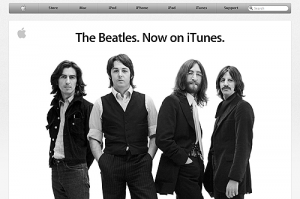Over the past few weeks, my social networks have been abuzz about the new HBO series, Girls. Girls is the brainchild of Lena Dunham who is currently a media darling after her film Tiny Furniture was received with much acclaim on the festival circuit. The 26 year-old Dunham, who writes and directs Girls, also stars in the show as the character Hannah. Among my contacts, the Judd Apatow produced show has received mixed reviews but I decided to watch the pilot (currently available on YouTube) and give it a chance. This is my take and I would warn you that there may be some spoilers in the following so you may want to watch first and read the rest of this after you watch.
The pilot begins with the character Hannah having dinner with her parents at what appears to be a fancy restaurant. As she shovels food into her mouth, her parents begin to slowly reveal that they no longer wish to bankroll her New York City lifestyle. We find out Hannah has been out of college for two years now and is working an internship while trying to finish writing her memoirs. At the time of this writing, I’m just a couple of years older than Dunham as I’m going on 28 years-old in July. When I was two years out of college, I wasn’t working an unpaid internship while my parents paid for all of my expenses. On the contrary, I had to work. Immediately following graduation, I found a job. Not particularly well paid compared to some of the jobs my classmates landed at financial firms, but it was a job nonetheless — it paid the bills. In Girls, the prospect of having to try and find a job horrifies Hannah and she spend most of the rest of the scene arguing with her parents and trying to convince them to continue to financially support her. I know lots of twenty-somethings, and most of them don’t behave this way.
Later in the episode, we are introduced to Hannah’s best friend Marnie played by the stunning Allison Williams. Williams actually feels like the most realistic character. She is portrayed as an ice queen as her boyfriend clearly likes her far more than she likes him. Marnie and Hannah even discuss the possibility of Marnie potentially breaking up with him because he is simply too nice for Marnie. This character is at least self aware as she notes “I feel like such a bitch” for wanting to dump a guy who, as far as we know, has been nothing but doting. However, I have a qualm with this scene: who hangs out in the tub naked with their girlfriends shaving their legs together? I dormed in college and, Judd Apatow, I can assure you this probably happens less often than you’d like to believe! Also, we hear that they watch Mary Tyler Moore together but, correct me if I’m wrong, Mary Tyler Moore was a WORKING GIRL. These girls don’t seem to do much of anything, but we’ll get to that in due time.
To follow the Sex and the City mold, Girls appears to follow four primary protagonists with Dunham playing the lead (the Carrie role, if you will). The next character introduced, Shoshanna, even makes reference to this. She points out her Sex and the City poster to her new roommate, British cousin Jessa. Shoshanna, played by Zosia Mamet, is over the top in her enthusiasm for the show and which Sex and the City character she most embodies. While I don’t think it’s a stretch, what should have been a nod with a smirk to a former HBO heavyweight and similarly themed series is instead a long, drawn out, drunken overt surly wink. To say it felt forced is an understatement.
When Hannah’s character is at her internship, we meet our first minority — the Asian graphic designer who is apparently more valuable than Hannah because she knows Photoshop! Her scene ends swiftly as Hannah’s boss interprets her “I can’t afford to work for free anymore” comment as “I quit.” This then leads Hannah into the arms of her actor lover with whom we can assume she’s had an off again, on again history. They wax poetic about the working world and the lover, Adam, confesses that his parents don’t support him — wait for it — his grandma does! Adam’s grandma gives him $800 a month towards living expenses so, as he puts it, “I don’t have to be anyone’s slave.” At this point, I’m almost ready to turn off the TV and walk away. Again, I’m not in my 30’s — I’m a twenty-something with lots of twenty-something friends. My friends who aspire to be actors work their fucking asses off. Most of them work crappy jobs at Starbucks or administrative assistant gigs that give them the flexibility to go out on auditions and work on their personal projects. It’s not easy for them and most of them don’t have their grandma’s giving them what amounts to rent every month.
The interaction between Hannah and Adam is so awkward it hurts. Hannah can stand up to her parents to try and make them give her money but she’s weak and powerless when with Adam? She asks Adam to retrieve a condom before they have sex and he replies “I’ll consider it.” Later, she confides in him about how her rapid weight gain spurred her tattoos to which he replies, “You’re not that fat anymore.” All of this seems normal to Hannah; she doesn’t bat an eye. And their sex scene is probably the worst of it; I know premium television seems to require them, but in this case it really didn’t seem necessary at all.
Finally, toward the end of the episode, Hannah — who is now high on some sort of opium tea — decides to storm into her parent’s hotel room and demand that they support her because she has a “voice of a generation.” If Lena Dunham’s voice is the voice of a generation then it clearly isn’t mine. Her voice, which I assume is scattered over all these characters, tells of a breed of entitled bratty little girls. In keeping with the entitlement, Hannah pleads “All I’m asking for is $1100 per month every month for the next 2 years.” Wow, what I would’ve given to have someone gift me $1100 per month! Instead, I had to earn it. And to be honest with you, I probably earned that much working while I was in college full time!
The end of the episode leaves a particularly bad taste in my mouth. Hannah’s parents check out of the hotel and Hannah wakes up in their hotel room, alone. Her first inclination is to order room service! Yes, room service after her parents explained how they can’t afford to, you know, pay for this make-believe lifestyle she leads. Upon finding that the room service tab is fully closed, she decides she should leave before housekeeping comes. On the hotel room desk, she finds an envelope addressed to her with some money. Her parents also left an envelope on the desk for housekeeping. Hannah steals the money left for housekeeping and pockets it before leaving. Oh, and by the way, at the end of the episode we get minority sighting #2; the homeless black man that sings at Hannah as she walks down Sixth Avenue. I thought there were more minorities in New York City, but I guess I’m just mistaken.
One of my friends, who saw this show before I did, described the girls as “vapid” and I can’t say I blame her. Girls is a terrible portrayal of elite, entitled twenty-somethings living a fantasy Disney princess life in New York City on borrowed money and/or trust funds. But perhaps I’m not part of the key demographic for this show as I’m not white, I don’t live outside my means and I don’t have other people footing my cable bill? To be honest, this makes me rather sad. I was looking forward to Girls being an exploration of coming of age as women in a big city where you need to work hard (and sometimes get a lucky break here and there) to survive. Instead, it was a bunch of unredeemable adult characters acting like little girls. But, as the title suggests, maybe that’s the point. Though, after that pilot, I won’t be sticking around to find out.




 A more straightforward entrant to the wearables market from the fashion world is Tory Burch. Burch has actually partnered with Fitbit to essentially create “cases” for their Flex tracker product. Instead of the band typically associated with Fitbit products, Fitbit Flex users can insert their Flex into various Tory Burch wearable accessories. At current time, there are three different finish options for a cuff and three different finish options for a pendant. The pendant seems to be an elegant solution to counting your steps while also looking elegant for a business meeting, for example. However, as you can guess, this integration purely tracks your activity and, unlike some of the other examples noted, doesn’t provide any degree of interaction or push notification.
A more straightforward entrant to the wearables market from the fashion world is Tory Burch. Burch has actually partnered with Fitbit to essentially create “cases” for their Flex tracker product. Instead of the band typically associated with Fitbit products, Fitbit Flex users can insert their Flex into various Tory Burch wearable accessories. At current time, there are three different finish options for a cuff and three different finish options for a pendant. The pendant seems to be an elegant solution to counting your steps while also looking elegant for a business meeting, for example. However, as you can guess, this integration purely tracks your activity and, unlike some of the other examples noted, doesn’t provide any degree of interaction or push notification.
